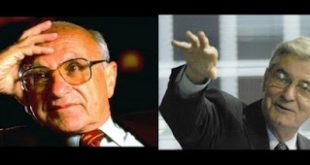Lance Taylor in Beijing (with me, center), 2001Full paper for download here. From Duncan Foley's recollection cited in the paper.Lance had what one might call a casual approach to every-day dress, though he appeared for public talks well turned out even with rather jaunty accessories. It was not unusual, however,for him to appear in his office in the working clothes of a Maine farmer. On some of these occasions, particularly when travel delays or cancellations disrupted work plans, I would...
Read More »Rational expectations, New Classicals, and Real Business Cycles Schools
[embedded content] A video conversation with LP Rochon and my co-author Bill McColloch on our chapter for the forthcoming book on the history of ideas. Many topics, including Friedman vs Lucas relevance, the Lucas critique, the empirical turn in the profession, and more. More info on the book soon.
Read More »A theory of economic policy and the role of institutions
Nicola Acocella published a paper in the Journal of Economic Surveys (a free, preliminary version is available here) a paper on the development of the theory of economic policy. Acocella is clearly fully aware of the differences between classical political economics and marginalism (neoclassical economics). And he dismisses the pre-margnialist views on economic policy as being unsystematic and devoid of general principles. In his words: Most classical writers and the marginalists had...
Read More »The positive profit with negative surplus-value paradox
New paper by Lucas (not that one) and Serrano. From the abstract: This paper explains the “positive profits with negative surplus-value” example of Steedman (1975) and shows that while in joint production systems individual labour values can be negative, the claim that the total labour embodied in the surplus product of the economy (surplus-value) can also be negative is based on assumptions that have no economic meaning (such as negative activity levels). The paper also provides a way to...
Read More »Who is the real revolutionary figure in modern macro, Friedman or Lucas?
Who's your daddy? Just finished my summer macro class (last Friday actually; grades were due Monday). One of the things that always becomes important in the course is how to define the break between Keynes, or at least Keynes and the Old Neoclassical Synthesis, on the one hand, and Friedman and Lucas, in the case of the latter both the New Classical models (monetary misperception) and Real Business Cycle (RBC) models, on the other. Many authors suggest that Lucas should be considered,...
Read More » Heterodox
Heterodox

